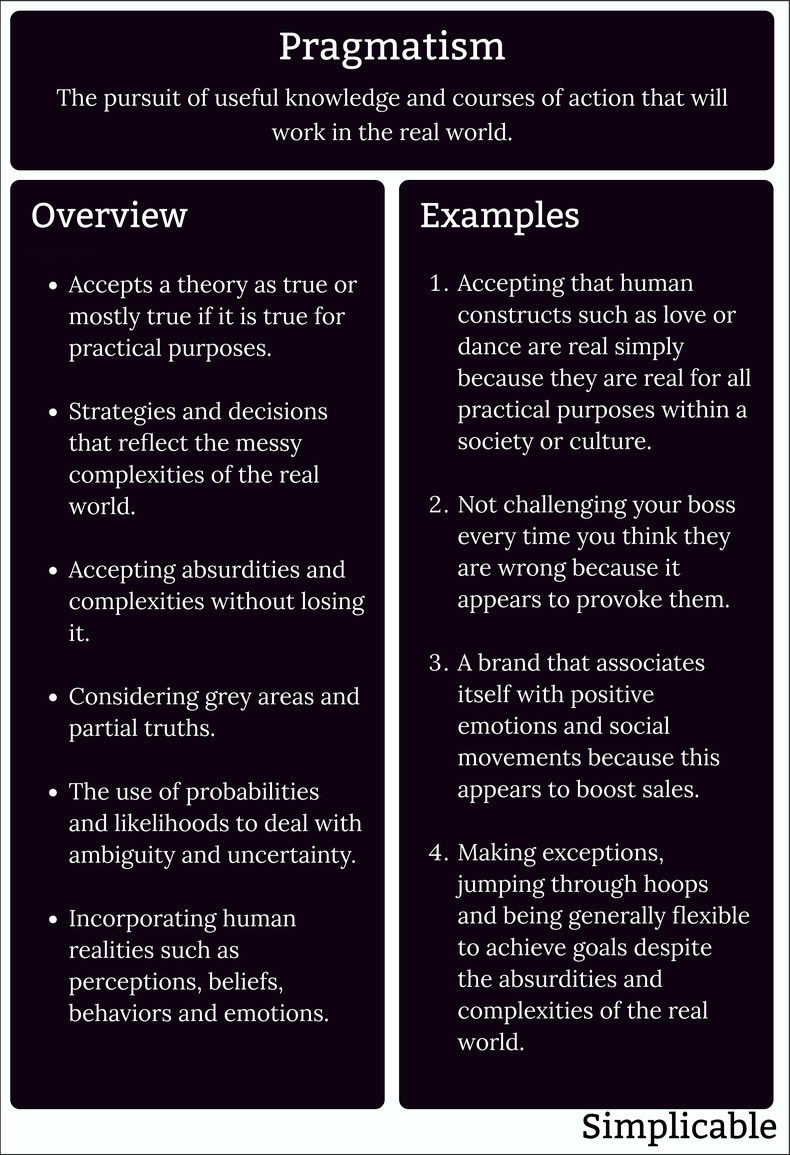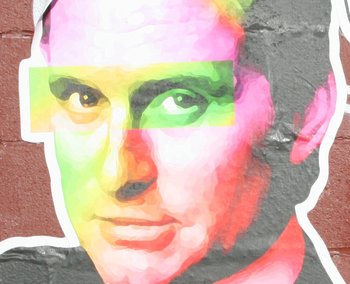
Realism & Optimism
Just drive down that road until you get blown up.Pragmatists are interested in the immediate and tangible results of knowledge. As such, they don't necessarily align to either realism or optimism. A pragmatist may view realists as overthinkers and optimists as too detached from immediate concerns.
~ George Smith Patton Jr., General of the United States Army who commanded the U.S. Seventh Army in WWII, the quote above were instructions he gave to reconnaissance troops
Grey Areas
Pragmatists are interested in partial truths, often known as grey areas, as these have useful applications. For example, if a boxer knows that an opponent is somewhat weak at defending his left side, this may be useful knowledge that isn't at all certain or concrete.Time & Resources
A good plan violently executed now is better than a perfect plan executed next week.A pragmatist will consider the cost of increasing the quality of knowledge in terms of both time and resources. For example, a furniture shopper who is pretty sure a chair is reasonable quality who doesn't have any more time to spend developing more certainty around the purchase.
~ George S. Patton
Universals
A pragmatist can consider something to be true without needing to confirm that it is universally true. For example, if humans commonly perceive the ocean as beautiful then the ocean is beautiful. It doesn't matter to a pragmatist that beauty may be a human construct that could be meaningless outside of the human experience.Logic
Pragmatists tend to avoid formal systems of logic that are concerned with true and false with nothing in-between. From a pragmatist's point of view, statistics and fuzzy logic may be more useful because they deal with partial truths. For example, a pragmatic driver will stop if there is a 1% chance that an entity on the road in front of them is a pedestrian. In this context, a true or false system of logic is relatively useless because you just need to know if there is any chance at all.Culture
I hear you say: ‘All that is not fact: it is poetry’. Nonsense! Bad poetry is false, I grant; but nothing is truer than true poetry.Pragmatists may view something as true in the context of a culture and not true in the context of another culture. In other words, they may incorporate complex human factors in their thinking if it is useful to do so.
― Charles Sanders Peirce
Intuition
Let us not pretend to doubt in philosophy what we do not doubt in our hearts.Pragmatists tend to be friendly to intuition and other thought processes that aren't based on any identifiable logic. According to this approach, an idea is useful in predicting the world has value, whether you understand the logic behind it or not.
― Charles Sanders Peirce
Belief
The moment you doubt whether you can fly, you cease for ever to be able to do it.Pragmatists view truth in terms of what creates practical outcomes. How far this can be taken and still be considered pragmatic is a matter of some debate. For example, a myth that is useful for communicating a risk or moral. Such a story is not technically true but accepting it as true may be practical in a particular context.
― J. M. Barrie, Peter Pan
Productive Assumptions
Productive assumptions is the practice of designing assumptions to maximize productivity, even if they aren't true. For example, a parachutist who assumes their parachute will not open if they don't carefully check it three times. This may not be true but may nonetheless serve some purpose.Change
Pragmatists drop old ideas as they lose their value and adopt new ideas as they become useful. For example, a marketing principle that is useful in explaining consumer behavior in one generation but not the next. Pragmatism also calls for an open mind that one's ideas and beliefs may be wrong. In other words, it's not pragmatic to adopt inflexible ideas that you fail to regularly test in the real world.Correspondence Theory of Truth
The correspondence theory of truth is the idea that something is a fact if it accurately describes the world. This is prone to errors such as confusing mere correlation with causation. However, it is a useful approach to knowledge validation that is commonly used by pragmatists.Coherence Theory of Truth
... philosophers have been less intent on finding out what the facts are, than on inquiring what belief is most in harmony with their system.The coherence theory of truth states that facts need to be coherent as a set. According to this standard, if something accurately describes the world, it is not a fact if it conflicts with other facts. If it rains every time your cat fights with your dog, your knowledge of how rain works would prevent you from developing wild theories that your cat has power over the weather. Pragmatists don't tend to build big coherent systems of truth where everything matches up. For example, a model of physics may be good at describing things a cosmic scale but terrible at predicting the behavior of tiny particles. A pragmatist would accept this model as useful to astrophysics without needing to align it to the laws of quantum physics.
Charles Sanders Peirce
Certainty
Are you sure twice two are four? Not at all. A certain percentage of the human race are insane and subject to illusions. It may be you are one of them, and that your idea that twice two is four is a lunatic notion, and your seeming recollection that other people think so, the baseless fabric of a vision.It is common for pragmatists to accept things as probably true or mostly true. In many cases, pragmatists doubt that humans can understand the universe well enough to say that anything is certainly true.
― Charles Sanders Peirce
Overview
Pragmatism seeks knowledge that explains the real world without need of certainty, consistency or universal principles. It seeks decisions and strategies that are likely to work even if they are complex, absurd or flexible.
Discussion
Pragmatism is a philosophical tradition founded by the American philosopher, logician, mathematician and scientist Charles Sanders Peirce around 1870. Peirce is also considered one of the founders of modern statistics. Pragmatism is viewed as a cornerstone of American culture that is also used to explain the extraordinary characteristics of the American economy.| Overview: Pragmatism | ||
Type | ||
Definition (1) | The pursuit of practical knowledge that is immediately useful. | |
Definition (2) | An approach to knowledge that looks at the value of ideas in explaining or predicting the world. | |
Definition (3) | The prioritization of useful knowledge over certain knowledge. | |
Definition (4) | The idea that knowledge is inseparable from the human experience and human created concepts such that things are real if humans believe them to be real. | |
Related Concepts | ||










































